Despite declining public attention to local news, many Americans express positive feelings about their local news media.
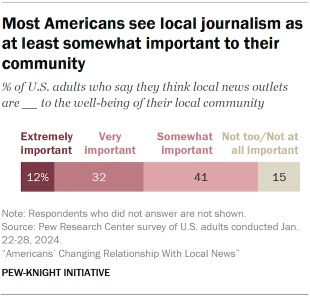
For instance, most U.S. adults (85%) believe local news outlets are at least somewhat important to the well-being of their local community, including 44% who say they are extremely or very important.
Those who feel more attached to their local communities are especially likely to hold this view: Around two-thirds of Americans who feel very attached to their communities (66%) see local news outlets as extremely or very important, compared with around a third (31%) of those who feel not very or not at all attached.
Older adults also are more likely to perceive local journalism as important to their community. Around half of U.S. adults ages 50 and older (51%) say local news outlets are extremely or very important, compared with 38% of adults under 50 – including 34% of those ages 18 to 29.
How people feel about their local news media’s performance
Most U.S. adults also think their local news media are doing their jobs well in several areas – largely unchanged from 2018.
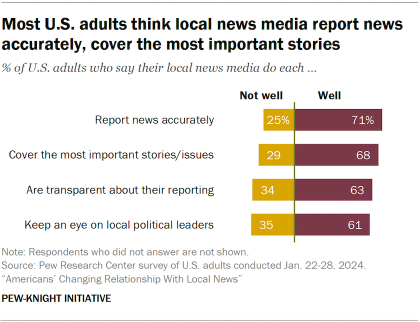
About seven-in-ten Americans say their local journalists are doing a good job of reporting news accurately (71%) and covering the most important stories and issues (68%). People are modestly less likely to believe their local news media are performing well at being transparent about their reporting (63%) and keeping an eye on local political leaders (61%). The share who say local media are doing well as political watchdogs is down slightly from 66% in 2018.
About a third of U.S. adults say their local news media are not doing well at keeping an eye on local political leaders (35%) or being transparent about their reporting (34%).
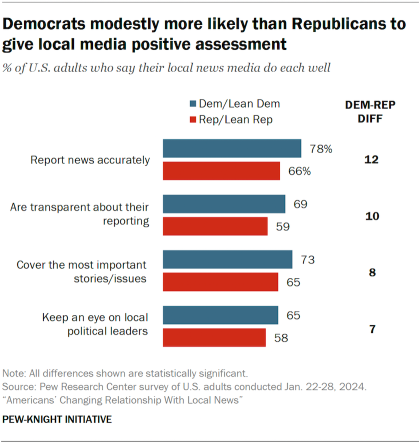
Democrats (including independents who lean toward the Democratic Party) are somewhat more likely than Republicans and GOP leaners to say their local journalists report news accurately, are transparent about their reporting, keep an eye on local political leaders and cover the most important stories and issues, although majorities in both parties hold these views.
There have been no major changes since 2018 when it comes to differences between the two major political parties in views toward local media. Past research has found a much larger partisan divide in views toward national news organizations, with Republicans expressing much more negative opinions.
There are a few other demographic differences in views of the job local media are doing:
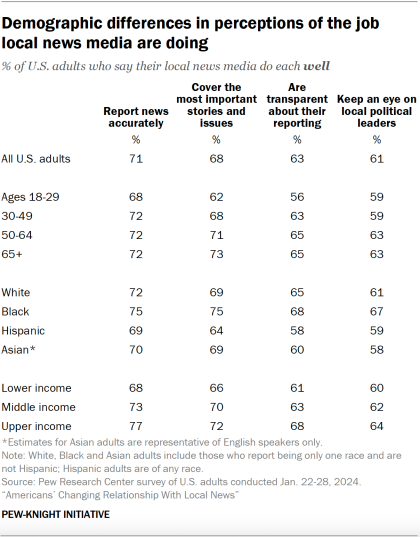
- Black Americans are slightly more likely than all other racial and ethnic groups to say their local news media are doing well at keeping an eye on local political leaders (67%) and covering the most important stories and issues (75%).
- U.S. adults ages 18 to 29 are modestly less likely than other age groups to say local news outlets are transparent about their reporting (56%) or cover the most important stories and issues (62%).
- Lower-income Americans are less likely than upper-income Americans to say their local journalists are good at reporting news accurately (68% vs. 77%).
- Those who say they are very attached to their local community are more likely to give their local media high marks on all these measures – for instance, 74% of this group say their local media do well at being transparent about their reporting, versus 54% of those who say they are not very or not at all attached to their community.
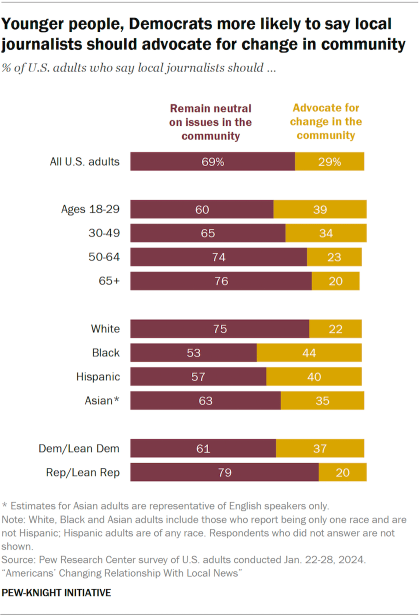
Views of neutrality vs. advocacy in local news
One traditional journalistic value that has been the subject of recent debate is neutrality.
Most Americans (69%) say local journalists should remain neutral on issues in their communities. But 29% say local journalists should advocate for change in their communities, with some demographic groups especially likely to hold this view:
- Younger people: Around four-in-ten U.S. adults ages 18 to 29 (39%) say local journalists should advocate for change in the community, compared with two-in-ten of those ages 65 and older.
- Black, Hispanic and Asian Americans: Black (44%), Hispanic (40%) and Asian Americans (35%) are more likely to support journalists advocating for change in their communities than White Americans (22%).
- Democrats: Democrats and Democratic-leaning independents are nearly twice as likely as Republicans and Republican leaners to say local journalists should advocate for change (37% vs. 20%).
- Lower-income Americans: About a third of lower-income Americans (36%) say local journalists should advocate for change, compared with 26% of middle-income and 22% of upper-income Americans.
- City dwellers: Urban residents (38%) are more likely than people in suburban (28%) or rural (23%) areas to say local journalists should advocate for change in their communities.
Most Americans think local journalists are in touch with their communities
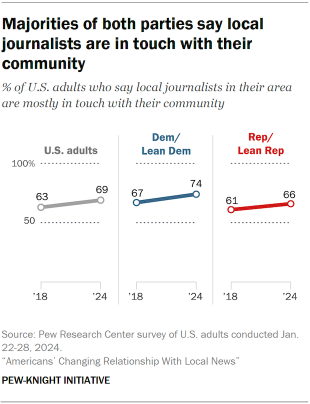
Americans are far more likely to say local journalists in their area are mostly in touch (69%) rather than out of touch (28%) with their local community. The share of U.S. adults who say local journalists are in touch with their community has increased slightly since 2018, from 63%.
Democrats (74%) remain modestly more likely than Republicans (66%) to say local journalists are in touch with their community, with small increases within both parties since 2018.
There are only slight age differences on this question. About two-thirds of Americans ages 18 to 29 (65%) say local journalists are mostly in touch with their community, as do 69% of those ages 30 to 49 and 50 to 64, and 72% of those 65 and older.
Interactions with local journalists
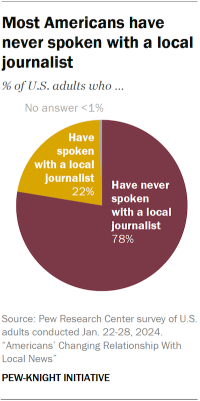
Even though most Americans say local journalists in their area are in touch with their community, about three-quarters (78%) say they have never spoken with or been interviewed by a local journalist. This is consistent with past years: In 2018, an identical share said they had never spoken with a local journalist, and 74% said the same in 2016.
Americans with a postgraduate degree (29%) are more likely to have spoken with a local journalist than those at all other education levels. Around one-in-five U.S. adults with a bachelor’s degree (22%), some college (21%) or high school or less (19%) say the same.
Also, a slightly larger share of men (24%) than women (19%) say they have talked to a local journalist.
Those who feel very attached to their communities (36%) are more likely to have spoken to or been interviewed by a local journalist than those who feel somewhat attached (21%) or not very or not at all attached (16%).




